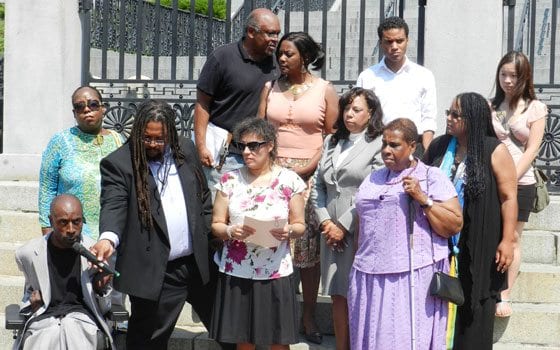
“We are an invisible population,” said Gayle Johnson, project coordinator of Massachusetts Alliance of African Peoples (MAAP).
Johnson, a visually impaired disability activist and an organizer for the Union of Minority Neighborhoods, spoke at a recent Statehouse news conference to applaud the Urban League of Eastern Massachusetts for its “State of Black Boston” report and to encourage the inclusion of data and policy recommendations regarding African Americans with disabilities.
“The rate of sensory, physical, and mental disabilities is high in black communities,” Johnson said. “National data show that 24.3 percent of blacks report having a disability as compared to 18.3 percent of whites. Yet, the Urban League presented a comprehensive report that does not address the needs of nearly one quarter of our community.”
Johnson urged the Urban League and its partners, the NAACP and the Trotter Institute, to expand the report.
Johnson preceded several speakers representing a cross-segment of blacks with disabilities and their supporters who commended the Urban League for raising awareness of the progress and challenges confronting Boston’s black communities.
Several provided data and anecdotal information on health, education, employment and other quality of life disparities experiences.
Keith Jones, executive director of Soul Touchin’ Experiences, noted that people of color with disabilities have higher rates of school dropout, unemployment, poverty and health problems than other people of color.
“When race or ethnicity and disability intersect, all of the negative outcomes are exacerbated,” he said. “People with disabilities need to be included when policy is being made; we must be at the table.”
Educational issues were addressed by Toni Saunders, executive director of Associated Advocacy Center-Visions for the Future, Inc., an education advocacy consulting agency for children with special needs.
“More than 30 percent of students with disabilities in Boston Public Schools did not graduate in 2010,” she stated. “Fifty-eight percent of students with disabilities failed MCAS.”
She asserted that these students become funneled into the “school to prison” pipeline. “Students with disabilities, particularly black students, are more likely to face disciplinary action and be suspended or expelled from school or even be arrested,” she said. “And once in the juvenile or criminal justice system, they have a CORI which makes employment even more difficult.”
Deborah Smith-Pressley, founder and CEO of the Garrett Pressley Autism Resource Center, stressed the need for job development and education. “We are willing, ready and able to work,” she said. “Many individuals are very excited and share a passion for the work force in green jobs, technology and landscaping, health care aides, childcare. Whether they are verbal or non-verbal they want to contribute to the work force and are very capable to do so.”
She suggested that people with disabilities can help find solutions to the challenges they face.
Florette Willis, MPOWER coordinator, a grassroots advocacy organization for people living with mental health issues said, “We need to remove the stigma that people with mental health disabilities face. Black people are therefore reluctant to seek out successful support services and mental health care.”
Willis went on. “Due to a lack of understanding of mental illness by the police,” she said, “many people with psychiatric disabilities are wrongfully arrested and end up with a CORI which makes it difficult for them to find housing and jobs.”
Specific recommendations were offered to increase understanding of disparities faced by black people with disabilities and for their inclusion in discussions about the black community.
Courtland Townes III, deputy director of the Boston Center for Independent Living, listed several recommendations: “Disability data needs to be included in the Urban League/NAACP/Trotter Institute ‘State of Black Boston’ report; the Boston Public Health Commission needs to increase its efforts regarding the disability community; state initiatives to eliminate disparities need to include disparities based on disability; and the Multi-Cultural Independent Living Center of Boston needs to be fully supported.”
Johnson closed the press conference by announcing that the Black People with Disabilities group and black immigrant groups in conjunction with the Massachusetts Alliance of African Peoples, a Project of the Union of Minority Neighborhoods, will hold its second annual statewide conference in late fall to continue the work of unifying black communities.
“We will no longer be invisible!” Johnson said.
That point was underscored by Louise Beach, community outreach specialist for the Multi-Cultural Independent Living Center of Boston and a longtime resident of Roxbury.
“We are your neighbors, your friends, your co-workers, your wives and husbands, your mothers and fathers, your sons and daughters, your brothers and sisters and taxpayers too!” she said.






